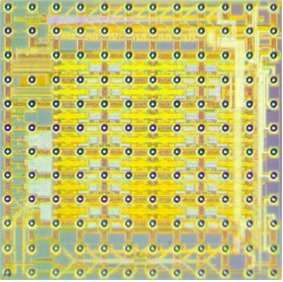Fully integrated 'hot qubit' quantum processor using commercially available technology

Equal1 Laboratories (Equal1), a silicon-based quantum computing company, today announced the company is the first to demonstrate a fully integrated quantum processor unit (QPU) operating at 3.7 kelvin ― a major milestone with implications for the trajectory of quantum computing.
The company is addressing a major challenge for the quantum computing industry of scaling the number of qubits so that a quantum computer can tackle useful, real-world problems.
With its QPU, Equal1 has developed a disruptive, scalable and cost-effective quantum computing technology, based on a commercially available silicon semiconductor process.
The QPU employs patented, Equal1-designed, nanometer-scale quantum dots to create qubits (the quantum equivalent to digital bits) on a standard silicon CMOS process. In addition to the silicon qubits, all control and read-out electronics required for a fully functioning QPU are integrated on-chip with over 10 million transistors.
In addition to developing its QPU, Equal1 has designed and manufactured the closed cryogenic and vacuum system, together with the control and communication electronics to maintain the chip at 3.7 K and interface to room temperature.
Due to the operation of the qubits at 3.7 K (referred to as "hot qubits") and the level of integration the team has achieved, the form factor of the quantum demonstrator is far smaller than alternative technologies (rack-sized versus room-sized).
Equal1 was founded by Dirk Leipold, Mike Asker and Professor R. Bogdan Staszewski and is a spin-out from the UCD School of Electrical and Electronic Engineering. The Equal1 team has offices at NovaUCD, the Center for New Ventures and Entrepreneurs at University College Dublin, and in California.
Elena Blokhina, Equal1 CTO, said, "Our team's ability to demonstrate quantum behavior on a fully integrated QPU will enable us to soon solve challenges in AI that cannot be solved today. We are proud of the milestone accomplishment and are excited to scale our technology to the next level."
Two Equal1 quantum demonstrator machines ("Alice") each have been running for over 24 cumulative months with no unplanned downtime. On Alice, Rabi oscillations have been observed in three-dot arrays with a coherence time of 150 ns.
Due to the integrated nature of the technology, the electronic pulses that control the qubits are generated on-chip and therefore are extremely fast, enabling a short enough pulse time for the QPU to demonstrate quantum behavior. The team has proven the repeatability of the results and consistency with quantum modeling and simulations.
"By taking advantage of shrinking transistor geometries, we have demonstrated that integration into the millions of qubit range is possible, with moderate cooling requirements compared to other qubit technologies," said, Equal1 CEO, Dirk Leipold.
"Our quantum computing technology delivers affordable AI solutions to our customers at a much lower carbon footprint."
The QPU was manufactured on GlobalFoundries leading low power 22FDX platform, requiring no special process extensions for quantum operation. Employing this ultra-low power platform at GlobalFoundries Fab 1 in Dresden, Germany played a key role in enabling Equal1 to achieve the results presented here.
The Equal1 team designed the complex mixed signal circuits, such as high-speed pulse generator, ADCs, DACs and cryogenic memory, using EDA software from Cadence Design Systems, Inc., in particular Specter Simulation Platform's new support for ultra-low temperature models which are key to cryoelectronic design validation.
Commenting on the achievement, Cadence Product Management Director for Circuit Simulation Products Joy Han said, "This is a very exciting result and shows a disruptive and potentially game-changing approach to quantum computing. We hope to continue our collaboration with Equal1 long into the future."
Provided by University College Dublin





















